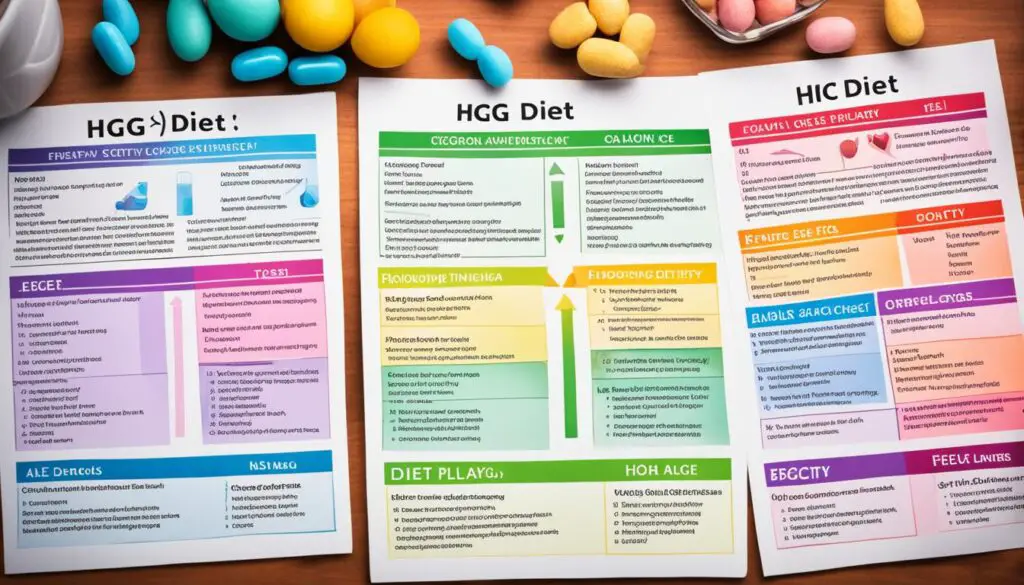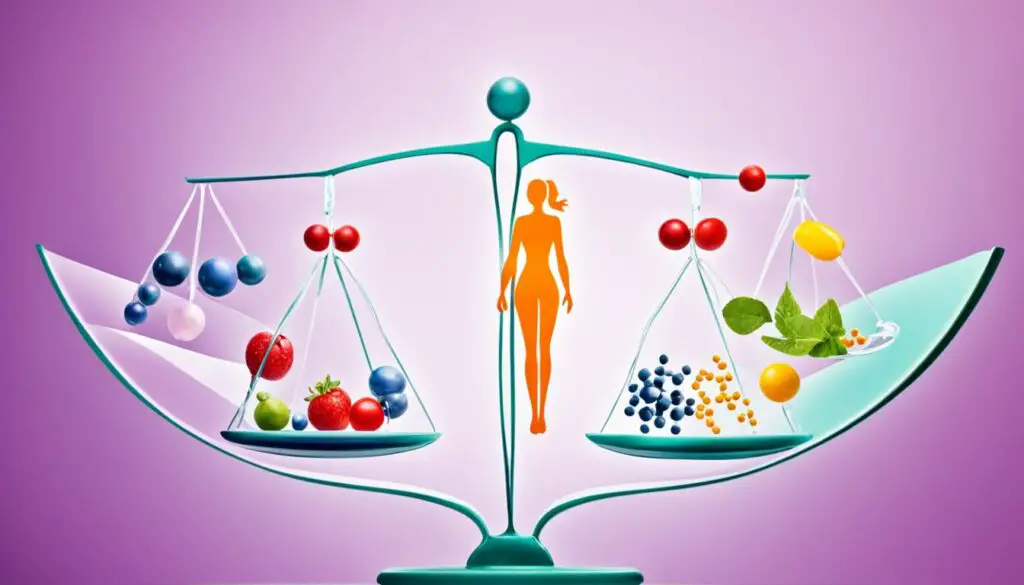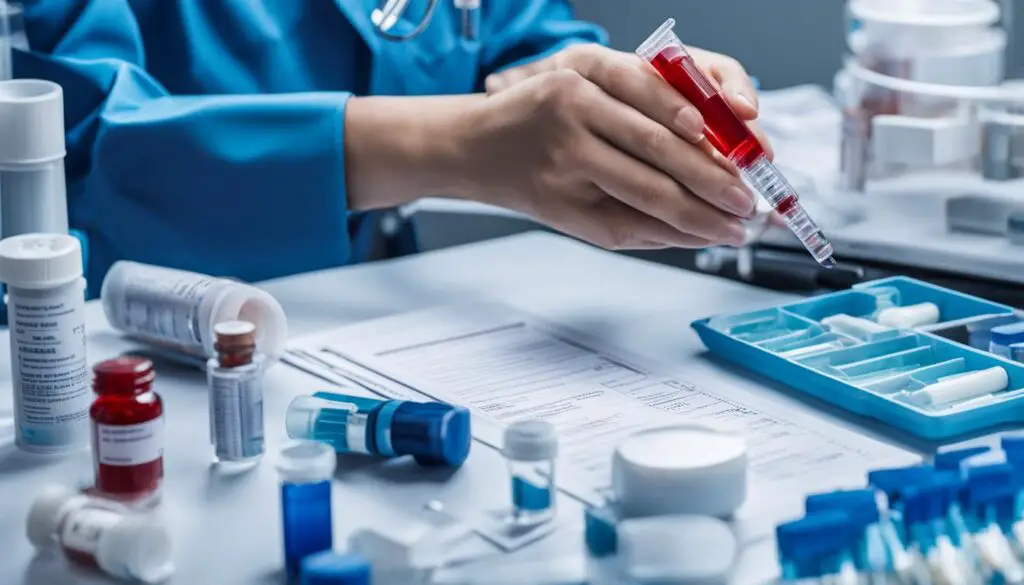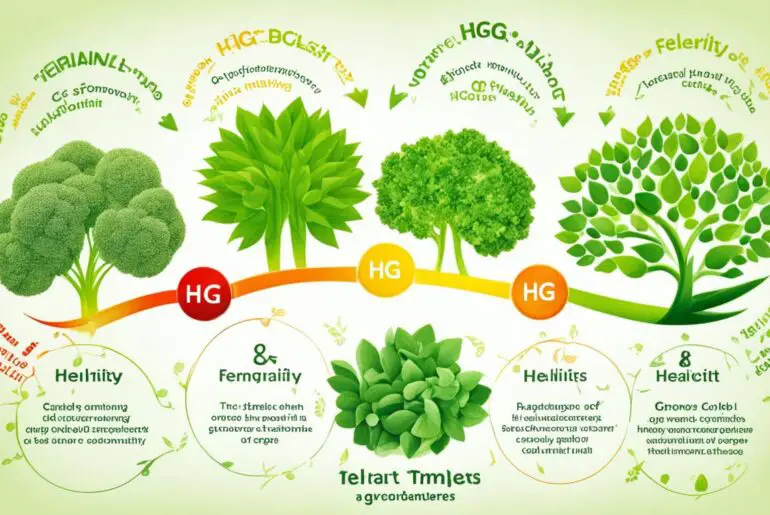Have you ever wondered how the HCG diet plan affects estrogen levels and hormonal balance? Does this controversial weight loss regimen impact your hormones in ways you never considered? Let’s delve into the relationship between the HCG diet and estrogen to uncover the truth about hormone health and weight loss.
The HCG diet is a popular yet controversial weight loss plan that involves severe calorie restriction. But what effect does this extreme dietary approach have on estrogen levels, a crucial hormone in our bodies? Is there a connection between the HCG diet and hormonal balance? In this article, I will shed light on the potential impact of the HCG diet on estrogen levels and discuss the importance of hormone health in successful weight loss. Discover the truth behind this widely debated topic and take the first step towards optimizing your hormone health.
Key Takeaways:
- The HCG diet plan involves severe calorie restriction and is a controversial weight loss method.
- The FDA advises against using over-the-counter HCG products for weight loss due to potential health risks.
- Research suggests that the HCG diet may affect estrogen levels, which could have implications for hormonal balance.
- Prioritize hormone health and consult with a healthcare provider before starting any weight loss regimen, including the HCG diet.
- Consider safer alternatives for weight loss, such as adopting a balanced diet and engaging in regular exercise.
What Is the HCG Diet?
The HCG diet is a weight loss plan that involves a very low-calorie diet coupled with supplemental HCG hormone injections. This diet was first introduced in the 1950s by a British physician who claimed that the HCG hormone could facilitate fat burning without causing hunger or weakness. However, scientific studies have failed to substantiate these claims and the use of HCG for weight loss is not approved by the FDA.
The HCG diet typically consists of two main phases: a loading phase and a weight loss phase. During the loading phase, participants consume high-fat, high-calorie foods to build up fat stores. This is followed by the weight loss phase, where calorie intake is dramatically reduced to around 500 calories per day. It is believed that the combination of severe calorie restriction and hormone injections leads to rapid weight loss.
However, it’s important to note that the safety and effectiveness of the HCG diet have been called into question. The FDA has issued warnings against the use of HCG for weight loss, as there is insufficient evidence to support its efficacy. Scientific studies suggest that any weight loss experienced on the HCG diet is primarily due to the severe calorie restriction rather than the hormone injections themselves.
Quote: “The use of HCG for weight loss is not approved by the FDA and scientific studies have failed to support its efficacy.” – American Journal of Clinical Nutrition
While the HCG diet may result in rapid weight loss, it is crucial to consider the potential risks and side effects. Severe calorie restriction can lead to nutrient deficiencies, gallstone formation, irregular heartbeat, and electrolyte imbalances.
Quote: “Severe calorie restriction carries potential risks, including nutrient deficiencies, gallstone formation, and electrolyte imbalances.” – International Journal of Obesity
It is always recommended to consult with a healthcare provider before embarking on any weight loss regimen, including the HCG diet. They can provide personalized guidance and help determine the most appropriate and safe approach to achieving weight loss goals.
Safety and Effectiveness of the HCG Diet

The safety and effectiveness of the HCG diet have been a topic of concern. The FDA has deemed HCG diet products illegal and advises against their use for weight loss. Scientific studies have shown that weight loss on the HCG diet is primarily due to the drastic calorie restriction, not the hormone itself.
Severe calorie restriction can lead to nutrient deficiencies, gallstone formation, irregular heartbeat, and other potential risks. The HCG diet may result in fatigue, irritability, depression, fluid buildup, and even blood clot formation as reported by some individuals.
Potential Risks of the HCG Diet
To fully understand the potential risks of the HCG diet, it is essential to consider the following:
- Calorie Restriction: The extremely low calorie intake of the HCG diet may lead to nutrient deficiencies and other health complications.
- Malnutrition: Restricting calories to such a low level may result in inadequate intake of essential vitamins, minerals, and other nutrients, potentially leading to malnutrition.
- Gallstone Formation: Rapid weight loss, as experienced on the HCG diet, can increase the risk of gallstone formation.
- Irregular Heartbeat: Severe calorie restriction may cause electrolyte imbalances, which can lead to irregular heartbeats.
- Side Effects: Fatigue, irritability, depression, fluid buildup, and blood clot formation are among the reported side effects associated with the HCG diet.
Considering the potential risks and lack of scientific evidence supporting its effectiveness, it is crucial to consult with a healthcare provider before starting the HCG diet or any other weight loss regimen.
“The safety and effectiveness of the HCG diet have been called into question. Severe calorie restriction can lead to nutrient deficiencies, gallstone formation, irregular heartbeat, and other health risks.” – FDA
Impact of the HCG Diet on Estrogen Levels
The HCG diet, known for its controversial weight loss approach, has the potential to impact estrogen levels and hormonal balance. Initial research suggests that the use of HCG may stimulate the production of androgen cells, which could have implications for estrogen levels in the body. However, it is important to note that further studies are necessary to fully understand the effects of the HCG diet on estrogen and hormonal regulation.
Before embarking on the HCG diet, it is crucial to consider the potential risks and consult with a healthcare provider, especially for individuals with specific hormonal conditions or concerns. Hormonal balance plays a vital role in overall well-being, and any dietary intervention should be approached with caution and expert guidance.
Achieving and maintaining hormonal balance is essential for optimal health and weight management. Consulting with healthcare professionals, such as endocrinologists or primary care physicians, can provide personalized insight and help determine the suitability of the HCG diet based on individual hormonal profiles.
In summary, the impact of the HCG diet on estrogen levels and hormone regulation requires further investigation. Consultation with healthcare professionals is crucial to ensure informed decision-making and to address any potential risks to hormonal balance and overall health.
Risks and Side Effects of the HCG Diet

The HCG diet poses several risks and side effects that individuals should be aware of before considering this weight loss plan. The severe calorie restriction involved in the HCG diet can lead to various health complications and undesirable outcomes. Here are some of the potential risks and side effects:
- Nutrient deficiencies: The extremely low calorie intake on the HCG diet may result in nutrient deficiencies, including essential vitamins and minerals. This can compromise overall health and well-being.
- Gallstone formation: Rapid weight loss, such as that experienced on the HCG diet, can increase the risk of gallstone formation. Gallstones can cause severe pain and may require medical intervention.
- Irregular heartbeat: Severe calorie restriction can lead to electrolyte imbalances, which may contribute to an irregular heartbeat. This condition can pose serious health risks and requires medical attention.
- Side effects: Some individuals following the HCG diet have reported side effects such as fatigue, irritability, depression, fluid buildup, and breast swelling in males. These side effects can be distressing and impact overall well-being.
- Blood clot formation: There is a concern that the HCG diet may increase the risk of blood clots forming and blocking blood vessels. This potentially life-threatening complication requires immediate medical attention.
It is crucial to carefully consider these risks before embarking on the HCG diet. Individuals should prioritize their health and well-being and explore safer alternatives for weight loss.
Risks and Side Effects of the HCG Diet
| Risks | Side Effects |
|---|---|
| Nutrient deficiencies | Fatigue |
| Gallstone formation | Irritability |
| Irregular heartbeat | Depression |
| Blood clot formation | Fluid buildup |
Quote:
I would strongly advise individuals to reconsider the HCG diet due to the potential risks and side effects involved. It is essential to prioritize your health and explore healthier alternatives for weight loss.
Before making any significant changes to your diet or embarking on a weight loss plan, consult with a healthcare provider for personalized guidance and recommendations.
Safer Alternatives for Weight Loss
If weight loss is the goal, there are safer alternatives to the HCG diet. It is important to focus on making healthy changes that promote sustainable weight loss and overall well-being. This includes adopting a balanced diet that provides adequate nutrients and calories, as well as engaging in regular exercise.
Consulting with a healthcare provider or a registered dietitian can help develop a personalized weight loss plan that takes into account individual needs, preferences, and any underlying health conditions.
By making these healthy lifestyle changes, you can achieve your weight loss goals in a safer and more sustainable way.
Additionally, it is important to remember that weight loss is a journey, and it requires patience and consistency. Setting realistic goals and celebrating small victories along the way can make the process more enjoyable and motivating.
| Safer Alternatives for Weight Loss | |
|---|---|
| 1. | Adopt a balanced diet that includes plenty of fruits, vegetables, lean proteins, and whole grains. |
| 2. | Limit added sugars, processed foods, and unhealthy fats in your diet. |
| 3. | Engage in regular exercise, such as brisk walking, cycling, or swimming, for at least 150 minutes per week. |
| 4. | Stay hydrated by drinking plenty of water throughout the day. |
| 5. | Get enough sleep to support overall well-being and weight management. |
| 6. | Manage stress levels through relaxation techniques, such as deep breathing exercises or meditation. |
| 7. | Consider working with a healthcare provider or a registered dietitian to craft a personalized weight loss plan. |
By implementing these healthier alternatives, you can achieve your weight loss goals while prioritizing your long-term health and well-being.
Importance of Hormone Balance for Weight Loss
Hormone balance is essential for both weight loss and overall health. When hormones, including estrogen, are imbalanced, they can contribute to weight gain and make it more challenging to lose weight effectively. Optimizing hormone levels through lifestyle changes can support weight loss efforts and promote hormonal health.
Achieving hormonal balance requires addressing various aspects of health, including diet, exercise, stress management, and sleep. A balanced diet rich in nutrients is crucial for hormone production and regulation. Regular exercise helps enhance metabolism and supports weight loss. Effective stress management techniques and sufficient sleep also play significant roles in hormone balance.
By understanding and addressing hormonal imbalances, individuals can develop a comprehensive plan to optimize hormone levels and achieve successful weight loss. Working with healthcare professionals, such as endocrinologists or primary care physicians, can provide valuable guidance and support.
Benefits of Hormone Balance for Weight Loss
Optimizing hormone levels can provide several benefits for weight loss:
- Enhanced metabolism: Balanced hormones help regulate metabolism, making it easier to burn calories and maintain a healthy weight.
- Reduced cravings: Hormonal balance can help control cravings and prevent overeating, leading to better weight management.
- Improved energy levels: Balanced hormones support increased energy levels, enabling individuals to engage in regular physical activity and maintain an active lifestyle.
By prioritizing hormone balance, individuals can promote successful and sustainable weight loss while improving overall well-being. Consulting with healthcare professionals can help tailor a personalized approach that addresses specific hormonal imbalances and supports the achievement of desired weight loss goals.
| Common Causes of Hormonal Imbalance | Signs of Hormonal Imbalance |
|---|---|
| Poor diet lacking essential nutrients | Unexplained weight gain or difficulty losing weight |
| Sedentary lifestyle with minimal physical activity | Irregular menstrual cycles or fertility issues |
| Chronic stress and high cortisol levels | Mood swings, irritability, or depression |
| Inadequate sleep or poor sleep quality | Low energy levels and fatigue |
The Role of Estrogen in Weight Management

Estrogen, a female sex hormone, plays an important role in weight management. It has multiple effects on the body that can impact metabolism, fat storage, and appetite regulation.
Imbalances in estrogen levels, whether they are high or low, can have implications for weight and body composition. High estrogen levels have been associated with increased fat storage, especially in the abdominal area. On the other hand, low estrogen levels may be linked to a slower metabolism and difficulty in losing weight.
Maintaining optimal estrogen levels is essential for effective weight management. Lifestyle factors, such as a healthy diet and regular exercise, can contribute to hormone balance and support weight loss efforts. A well-balanced diet rich in whole grains, lean proteins, fruits, and vegetables can help regulate estrogen levels and promote a healthy weight.
Regular physical activity also plays a crucial role in weight management and estrogen balance. Exercise can help increase metabolism, burn calories, and reduce fat storage. It can also improve insulin sensitivity, which can have a positive impact on estrogen levels.
However, it is important to note that the relationship between estrogen and weight is complex and can vary from person to person. Other factors, such as genetics, overall health, and lifestyle choices, can also influence weight management. Consulting with a healthcare provider or a registered dietitian can provide personalized guidance on optimizing estrogen levels and achieving healthy weight management.
Lifestyle Tips for Hormone Balance and Weight Management
- Include plenty of fiber-rich foods, such as whole grains, fruits, and vegetables, in your diet.
- Choose lean sources of protein, such as poultry, fish, and legumes, to support muscle maintenance.
- Incorporate strength training exercises into your fitness routine to build lean muscle and boost metabolism.
- Manage stress levels through techniques like meditation, yoga, or deep breathing exercises.
- Ensure you are getting enough sleep to support hormone balance and overall well-being.
By adopting a balanced lifestyle that includes a healthy diet, regular exercise, stress management, and adequate sleep, you can promote optimal hormone balance and support your weight management goals.
Hormone Health and Weight Loss Strategies

Hormone health plays a significant role in successful weight loss strategies. When it comes to shedding those extra pounds, it’s important to consider the impact of hormones on your body and optimize their function. By implementing a few lifestyle changes, such as focusing on a balanced diet, regular exercise, stress management, and quality sleep, you can support hormone balance and enhance your weight loss efforts.
Eating a Balanced Diet
A balanced diet is key to supporting hormone health and achieving sustainable weight loss. Include nutrient-rich foods in your meals to fuel your body with essential vitamins and minerals. Opt for lean proteins, such as chicken, fish, tofu, and legumes, which provide amino acids necessary for hormone production and regulation. Don’t forget to load up on fruits, vegetables, and whole grains, as they offer essential nutrients and dietary fiber to support hormonal balance and overall well-being.
Getting Regular Exercise
Regular physical activity is not only important for maintaining a healthy weight but also supports hormone regulation. Exercise helps boost metabolism, burn calories, and improve insulin sensitivity, which contributes to weight loss. Aim for at least 150 minutes of moderate-intensity aerobic exercise, such as brisk walking, cycling, or swimming, each week. Additionally, incorporate strength training exercises to build muscle, as muscle mass can increase metabolic rate and aid in weight management.
Managing Stress
Chronic stress can disrupt hormone balance and hinder weight loss efforts. Find healthy ways to manage stress, such as practicing relaxation techniques like deep breathing, meditation, or yoga. Engaging in enjoyable activities, spending time with loved ones, and pursuing hobbies can also help reduce stress levels and promote a positive mindset, which is essential for maintaining long-term weight loss.
Prioritizing Quality Sleep
Adequate sleep is crucial for hormone health and weight management. Lack of sleep can disrupt hormone production and regulation, leading to increased hunger, cravings, and decreased metabolism. Aim for 7-9 hours of quality sleep each night to support optimal hormone function and enhance your weight loss journey.
Consulting a Healthcare Provider for Hormonal Health

When it comes to optimizing hormonal health and achieving weight loss goals, consulting with a healthcare provider is crucial. Whether it’s a primary care physician or an endocrinologist, healthcare professionals have the expertise to assess and address hormonal imbalances that may be impacting your weight management efforts.
One of the key benefits of consulting a healthcare provider is the ability to perform hormone testing. By analyzing hormone levels, healthcare providers can identify any imbalances or underlying conditions that may be affecting your weight. This personalized approach allows for targeted treatment and recommendations tailored to your specific hormonal needs.
Here are some ways in which a healthcare provider can support your journey towards optimal hormonal health and weight management:
- Personalized Lifestyle Recommendations: Based on your hormone test results and individual health profile, healthcare providers can provide personalized recommendations for diet and exercise. These recommendations are tailored to optimize hormone health and support your weight management goals.
- Monitoring and Adjustment: Regular monitoring of hormone levels ensures that any imbalances are addressed promptly. Healthcare providers can make necessary adjustments to treatment plans to ensure optimal hormone balance throughout your weight loss journey.
- Expert Guidance: Healthcare providers have a deep understanding of hormonal health and weight management. They can offer expert guidance and answer any questions or concerns you may have, empowering you to make informed decisions about your health.
A healthcare provider can perform hormone testing to assess hormone levels and identify any imbalances or underlying conditions that may be impacting weight. They can also provide personalized recommendations and guidance on lifestyle changes, including diet and exercise, to support optimal hormone health and weight management.
Remember, your hormonal health is unique to you, and a personalized approach is crucial for achieving long-term success. By partnering with a healthcare provider, you can embark on a comprehensive and evidence-based weight management plan that takes into account your individual needs. Together, you can work towards optimizing your hormonal health and achieving your weight loss goals.
Conclusion
The HCG diet is a controversial weight loss plan that claims to impact estrogen levels and hormonal balance. However, healthcare professionals have called into question the safety and effectiveness of this diet. It is important to note that the FDA does not approve the use of HCG for weight loss, and over-the-counter HCG products may pose health risks. To promote weight loss and maintain hormonal balance, it is recommended to focus on safer alternatives such as adopting a balanced diet, engaging in regular exercise, and consulting with healthcare providers.
Prioritizing hormone health and overall wellness is key to achieving successful and sustainable weight loss. Hormone balance is closely linked to weight management, and imbalances in estrogen levels can impact weight and body composition. By adopting a healthy lifestyle that includes nutrient-rich foods, regular physical activity, stress management, and quality sleep, individuals can support optimal hormone health and enhance their weight loss efforts.
Consulting with a healthcare provider, such as a primary care physician or endocrinologist, is crucial for individuals concerned about hormonal health and its impact on weight loss. Healthcare providers can perform hormone testing to assess hormone levels and identify any imbalances or underlying conditions. Based on the results, they can provide personalized recommendations and guidance on incorporating lifestyle changes that support optimal hormone health and achieve successful weight loss goals.
FAQ
What is the HCG diet?
The HCG diet is a very low-calorie diet accompanied by supplemental HCG hormone injections. It involves severe calorie restriction, typically just 500 to 800 calories per day, and is divided into two phases: a loading phase and a weight loss phase.
Is the HCG diet safe and effective?
The safety and effectiveness of the HCG diet have been called into question. The FDA does not approve the use of HCG for weight loss, and scientific studies have shown that weight loss on the diet is primarily due to severe calorie restriction, not the hormone itself.
Does the HCG diet impact estrogen levels?
The HCG diet may potentially impact estrogen levels due to its effects on hormone regulation. Research suggests that HCG may stimulate the production of certain hormones, including estrogen, which could have implications for hormonal balance.
What are the risks and side effects of the HCG diet?
The HCG diet poses several risks and side effects, including nutrient deficiencies, gallstone formation, irregular heartbeat, electrolyte imbalances, fatigue, irritability, depression, fluid buildup, and blood clot formation.
Are there safer alternatives for weight loss?
Yes, there are safer alternatives to the HCG diet. It is important to focus on making healthy changes that promote sustainable weight loss and overall well-being, such as adopting a balanced diet, engaging in regular exercise, and consulting with healthcare professionals.
How does hormone balance impact weight loss?
Hormone balance plays a crucial role in weight loss. Imbalances in hormones, including estrogen, can contribute to weight gain and difficulty in losing weight. Optimizing hormone levels through lifestyle changes can support weight loss efforts.
What is the role of estrogen in weight management?
Estrogen, a female sex hormone, can affect metabolism, fat storage, and appetite regulation. Imbalances in estrogen levels can impact weight and body composition. Maintaining optimal estrogen levels through a healthy lifestyle can support weight management.
How can hormone health and weight loss strategies be integrated?
Hormone health and weight loss strategies can be integrated by focusing on lifestyle factors such as a balanced diet, regular exercise, stress management, and quality sleep. Prioritizing overall wellness and hormone health can support successful weight loss.
Should I consult a healthcare provider for hormonal health?
Yes, it is beneficial to consult a healthcare provider for hormonal health concerns. They can perform hormone testing, identify imbalances or underlying conditions, and provide personalized recommendations to support optimal hormone health and weight management.
What are the key takeaways regarding the HCG diet and estrogen levels?
The HCG diet is a controversial weight loss plan that may impact estrogen levels and hormonal balance. However, its safety and effectiveness have been called into question, and there are safer alternatives for weight loss. Prioritizing hormone balance and overall wellness is important for successful and sustainable weight loss.




